In a surprising and somewhat puzzling move, The National—a newspaper well-known for its strong support of the Scottish National Party (SNP) and its pro-independence stance—has criticised Scottish Labour politicians for visiting one of Scotland’s most important industrial sites: the BAE Systems shipyards in Glasgow.
The paper’s front-page headline on 29 August 2024 reads, “Labour trio slammed following visit to arms factory,” framing the visit in an unusually negative light.
This is particularly noteworthy because The National usually champions Scottish interests and industries.
This article is the opinion of the author and not necessarily that of the UK Defence Journal. If you would like to submit your own article on this topic or any other, please see our submission guidelines.
These shipyards are a vital part of Scotland’s economy, supporting thousands of jobs and continuing the country’s proud tradition of shipbuilding.
The front page of a Scottish newspaper is slamming Scottish politicians for visiting a Scottish shipyard, or as they call it, presumably to whip up anger, an “arms factory”. This, we’re assured, isn’t parody. https://t.co/YJun1gQhEQ
— UK Defence Journal (@UKDefJournal) August 29, 2024
Given this context, one might expect a newspaper that’s so pro-Scotland to be more supportive of a visit like this. Instead, the paper’s critique seems to be influenced by political rivalry.
The key difference is that the politicians in question are from the Labour Party, the SNP’s main political rival in Scotland. It appears that The National’s criticism isn’t just about the visit itself, but rather the fact that Labour politicians made it. The paper’s choice to describe the BAE Systems shipyard as an “arms factory” instead of a major Scottish shipyard adds a level of controversy that may be more about discrediting the Labour Party than offering a fair account of what happened.
Interestingly, The National never refers to the Ferguson Marine shipyard in Port Glasgow in the same way. Of note, the Scottish Government owns it and it is also doing work for BAE Systems on the new frigates being built there. Why does The National choose to label one shipyard an “arms factory” while seemingly overlooking the similar activities of another, especially when both contribute to Scotland’s defence industry? This selective use of language raises questions about the motivations behind the newspaper’s critique.
Also, rather oddly in my opinion, there’s no mention of Scottish Government ministers visiting this site, why?
The Impact of Language and Selective Quotes
A closer look at The National’s article reveals how the language and choice of quotes help shape its critical tone. The term “arms factory,” prominently featured in the headline, is a loaded phrase that immediately paints the shipyard—and by extension, the Labour politicians—as being involved in something morally questionable. It’s a deliberate choice of words that could conjure up images of weapons manufacturing rather than focusing on the broader role of the shipyard in Scotland’s economy.
The article also carefully selects quotes from critics of the visit, such as the American Friends Service Committee, which it describes as “a US-based Quaker organisation” offering “recommendations to investors seeking to build ethical portfolios.”
The group criticises BAE Systems for supplying “the Israeli military with a range of kit,” a statement that clearly aims to draw a controversial connection between the shipyard and international conflicts. By highlighting this perspective, the article frames the visit as if it’s something ethically questionable, suggesting that the Labour politicians are complicit in supporting an industry with global military ties.
Another line in the article reads, “The firm’s Scottish locations have attracted anti-Israel protests in the past over its links to Israel,” which further emphasises the negative angle without giving any context about the economic importance of the shipyard or its role in sustaining Scottish jobs. This selective focus suggests that The National is steering its readers towards a particular conclusion—one that’s critical of the Labour Party and supportive of the SNP’s stance.
Potential Political Motivations
It’s worth considering whether The National’s report is more about political positioning than objective reporting. The paper doesn’t just stop at calling the shipyard an “arms factory.” It goes further by citing criticism from external groups, like the American Friends Service Committee, which raises ethical concerns about BAE Systems’ involvement in defence manufacturing. By spotlighting these criticisms, the newspaper seems to be suggesting that these Labour politicians were wrong to visit a facility that plays such a crucial role in Scotland’s economy.
This framing raises questions about what The National is trying to achieve. The paper’s angle suggests that supporting a Scottish shipyard involved in defence manufacturing is somehow something to be ashamed of—at least when the support comes from Labour politicians. This is surprising, considering these shipyards are such a significant part of Scotland’s industrial heritage and economic strength. One might expect a pro-Scotland newspaper to be more supportive of this visit, regardless of the politicians involved.
Mixed Messages for Supporters of Scottish Industry
This approach can send a confusing message to The National’s readers and supporters of Scottish industry. The paper often advocates for the importance of a solid Scottish economy and the need for Scotland to be self-reliant—goals supported by a thriving shipbuilding sector. Yet, by criticising Labour politicians for visiting a critical industrial site, the newspaper risks undermining these goals in favour of a politically motivated narrative.
Framing the visit as a trip to an “arms factory” rather than a strategic engagement with a vital Scottish industry seems less about the specifics of the visit and more about taking a swipe at political opponents. It could suggest that The National prioritises Scottish Government loyalty over the broader interests of Scotland’s economy and workforce.
This choice of narrative risks overshadowing the positive aspects of political engagement with such a critical industry and might leave readers questioning whether the criticism is genuinely warranted or politically motivated.
Speaking about the yard, Labour’s Paul Sweeney MSP said:
“It is right that the UK Government has suspended the processing of arms export licences for sales to Israel and I signed a motion tabled by my colleague Katy Clark MSP calling for this in November last year.
The Govan and Scotstoun shipyards have operated since 1864 and 1906 respectively, and in that time, they have never exported any ships to Israel. Shipbuilding is synonymous with Glasgow, and it remains the biggest manufacturing industry in the city and the wider west of Scotland, sustaining more than 3200 shipyard workers.
The £12 million investment in the newly opened state-of-the-art Applied Shipbuilding Academy at Scotstoun Shipyard was supported by the former SNP-Green government with a Scottish Enterprise grant of £360,000, which was a clear recognition of the country’s biggest employer of apprentices.”
Political Move or Genuine Critique?
As a journalist focused on defence and the importance of industry in national security, I find The National’s editorial choice both surprising and somewhat troubling. By focusing its criticism on the Labour politicians’ visit to a Scottish shipyard, the newspaper appears to be letting political bias influence what could otherwise be seen as a positive engagement with Scottish industry.
This situation highlights how media narratives can be shaped by political allegiances, sometimes at the expense of broader national interests. Whether this was an accidental misstep or a deliberate political move by The National, it raises important questions about the role of the media in supporting—or undermining—Scottish industry and economic strength.
Moreover, it’s disappointing to see a publication that usually champions Scottish interests taking a stance that could be seen as counterproductive to those very interests. The newspaper’s approach to this story seems to place political point-scoring above the value of a balanced and fair portrayal of events.
At the UK Defence Journal, we aim to deliver accurate and timely news on defence matters. We rely on the support of readers like you to maintain our independence and high-quality journalism. Please consider making a one-off donation to help us continue our work. Click here to donate. Thank you for your support!




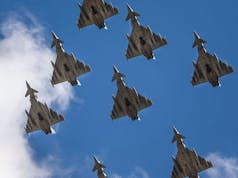
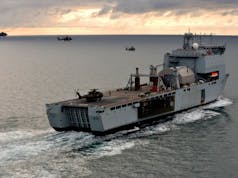
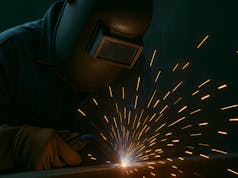

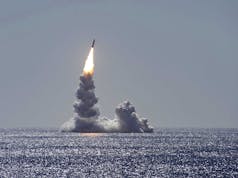

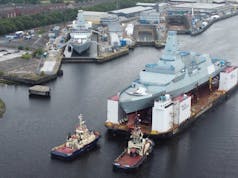



They were supportive when wee Nicola visited the yard.
give her a bard hat, a paintbrush and some grey paint a d show her venturer and tell her to get in with it sso v Z a space can be found for her campervan
It would not need real windows then.
Saves the sponds.
the whole thing issues around the vast investment into the idle .militant sectarian mess that is the Clyde sickens me.without the money from Westminster and the misguided fixation with them by the royal navy. the whole area would be a wasteland of rotting steel and gross unemployment the performances and production rates of those budget devouring, messes for me warrants a national inquiry. enough stop wasting time on the Clyde, reinvest in the north east at say palliion in Sunderland which still has one of the biggest covered, building halls in Europe design easier and quicker to produce ships, whoever the clown was who decided where the contracts were to be given conveniently thought a yardthat took four years to build a patrol ship should be required to build frigates should be shut at the door if the former north east shipyards.and we just build a new navy after all. in the meantime F the Clyde rant over I’ll ask nursey to give me my medication earlier today .
😆
Cannot really say you’re wrong, others with more knowledge may know why BAE preserved the Clyde over other ship building areas. But for me it’s a bit of a potential national risks as we don’t really know if Scotland will in the end decide to secede and take the UKs navel ship building with it.
Political class making promises that Scotland would build tge next batch of ships has a lot to do with it.
I hope that when politicians actually do turn up at these soirées that they put people on the Spot with searching questions and demand answers as to why production rates are not good enough.
if T32 happens but I’m sure it won’t I hope the Clyde are told in advance that would be highly doubtful that they would secure contract from it.
T32 will not happen rhetoric from the government is black holes and doom.
It was a decision by Gordon Brown to preserve shipbuilding jobs in the main, and funnily enough in his constituency. Then a spillover to the Clyde.
As far as I am aware it wasn’t a conscious decision but the end result of a lot of factors most of which were outside the control of BAe.
The largest remaining Shipbuilding facility in the U.K is in England, it’s owned by BAe and has the largest workforce and investment. BAe Barrrow just isn’t as visible as the Clyde.
Wind the clock back to the 1st decade of this Century and then move forwards.
BAe / Marconi and then Vospers all merged together largely as a result of HMG wanting to simplify shipbuilding to match the reduced order books.
Vospers had contracted to just building OPVs in Portsmouth Dockyard. There were numerous reasons for that but the increasing sizes of ships, costs and a lack of exports were all factors. The underlying biggest problem for the contraction in SB in the South was land and labour costs.
Swan Hunter effectively imploded after HMG refused to keep on pumping in more money. They had built some early T23’s but couldn’t compete with Scotstoun on price / delivery times. Then the Bay class fiasco was the last straw for MOD and HMG, I’ll not bore you with the minutia but it was pretty well all down to a level of Management incompetence that makes Fergusons look good.
CL pretty well gave up shipbuilding. they couldn’t win contracts and needed a huge revamp to build modern ships. Thankfully they reinvented themselves as a refit / maintenance hub.
H&W was dead on its feet, nothing was built after the 2 Point Class and was never a yard that built frigates or destroyers.
At the time Scotstoun were still delivering the last T23 at lower cost and faster than SH could and had a hot line.
Then the T45 were developed and the original BAe proposal was to build them all in the DDH at Barrow using blocks from Govan, CL and Portsmouth.
The Astutes weren’t yet in build so it made sense and was by far the lowest cost alternative available.
Unfortunately the knock on from the SH Bay class was that they got shifted to Barrow for completion and the Astute was struggling to get up and running. So Barrow went 100% Submarine only.
That just left BAe on the Clyde with a smaller facility at Portsmouth and the rest is History.
Interestingly when the T26 were supposed to be a class of 13, BAe planned to build a massive Frigate Factory but at Scotstoun rather than Govan. Simple reason was they owned Scotstoun but leased Govan from Port Glasgow.
probably the same affliction tha put blinkers on the MOD. FOR BUYING ALL OF THE FORCES KIT FROM THE BAE CATALOGUE.
Apart from the Type 31 – which is being built by Babcock and based on a Danish design….
Biased partisan reports help no one. However the National’s rare offering is no different to the rabid comments regularly seen on the front pages of the Daily Mail and Daily Express and the often less than impartial BBC! For a newspaper presenting a challenge and counter to the rest of the mainstream biased media such writings, which merely fuel the conspiracy-theory-out-of-context rumour mongers, do nothing to sustain an intelligent and informed debate, though does act as a counter.
More word salad to cover antisemitism.
Correct.
I am surprised you even know how to spell that! Criticising an administration that deserves to be hauled over the coals is not antisemitism. By accusing people of that you are permitting the abuses that the IDF are carrying out. In their blind pursuit of Hamas they are inflicting a huge amount of collateral damage, which will hauint them for years. That has NOTHING to do with anti-semitism. The utter tripe that Mail and Express editors produce is designed to appeal the unthinking idiots who believe anything they are told and lack the capacity to work things out for themselves. It used to be the Mirror and Sun that had that reputation but it has evolved to include Mail and Express.
“I am surprised you even know how to spell that!“
Nothing wrong with Bob’s spelling. Your interpretation of the spelling of ‘haunt’ on the other hand……
Perhaps you weren’t typing on a tiny screen in a moving bus! The U and I key are very close together under a big finger. It was more of a rhetorical comment referring to a very narrow and unthinking criticism!
,👍
Pretty much all outlets are biased for instance I can predict what I’ll read in the Guardian or Telegraph.
BBC is paid by tax payer under the violence of the law. So they have much more responsable. BBC journalists hate a lot of people that are forced to pay them under the gun.
Not paid by tax payer but individuals. However, it is still subject to bias by presenters, using their position to promote certain views or positions. In particular pursuing lines of argument more or sometimnes less critically to different people.
All nationalist politics all around the world is like this. Narrow minded and spite ridden.
There is still time to learn that a profession where most people go . as they often say . to to “change the world” cannot do journalism despite what they call themselves.
They are messianic persons. Journalists are nothing more than priests (activist is the modern name of priests) . That religion of theirs is politics.
The faith of most journalists is that the paradise can be achieved trough politics.
So expect the XXI century to be like XX century. Where the political religions murdered more hundreds of millions of people.
Cheers for that, I wouldn’t say I’m an activist.
Given that The National’s circulation is down to under 3000 print copies (2986 print copies per day) is there not a danger that they get more exposure here than via their own website ?
😀😀😀😀
Better sticking to ferries. They are exceptional at that.